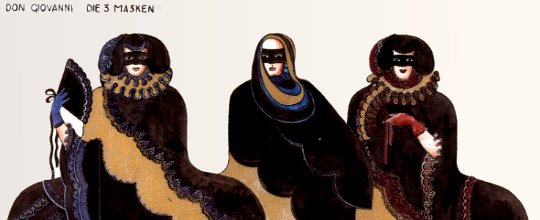Music and Theatre - History of the Collections up to 1949

1. The Frankfurt City Library
In 1897, the Frankfurt City Library, which had been founded at the end of the 15th century, acquired its first larger collection of music-related items: the approximately 1,750 ecclesiastical music manuscripts and printed music, dating from the 17th and 18th centuries, from the archives of the church foundations Allgemeiner Almosenkasten and the Weißfrauen- und Katharinenstift.
Collection of cantata manuscripts
Collection of printed part books
In 1904, before the old city's theatre was torn down, the older Theatre Library's collection (494 units of opera material) was transferred to the Frankfurt City Library. In 1924, this was supplemented by additional opera material (274 units) from the city's theatre. In 1984 the Library obtained 168 opera pieces, 330 pieces of orchestral music, 132 pieces of incidental music and 20 pieces of ballet music from the city's theatre. The material of about 1,000 operas performance is now part of the collection.
Opera Collection
Collection of music-related items from the city's Performance Halls
2. The Rothschild Library
In 1888, Hannah-Louise von Rothschild founded a privately financed library, open to the public, which was meant both to serve scholars and to educate the general public. The works from several private libraries owned by the Rothschild family made up its core. At the time the library was founded, music and theatre were seen as niche topics, along with art history and modern European languages and their literature. Dr. Christian Berghoeffer (1859-1938) was appointed as the head librarian.
To expand the music collection, Berghoeffer acquired primarily source publications and series of memorial publications, as well as compendiums of a composer's complete works which private individuals would only rarely be able to afford (Orlando di Lasso, Händel, Bach, Haydn, Mozart, Beethoven, Mendelssohn, and others).
Due to inflation at the end of the 1920s, the foundation was no longer sufficient to support the Library and it was taken over by the City of Frankfurt.
3. Manskopf's Musico-Historical Museum
Beginning when he was just a pupil, the Frankfurt wine merchant Friedrich Nicolas Manskopf (1869-1928) had collected souvenirs related to musicians and actors, a habit which he continued during his stays abroad (1887-88 in Lyon, 1889-90 in London, 1891-93 in Paris). These souvenirs included autographs and letters; printed portraits; caricatures and photos; theatre and concert programmes; posters; and miscellaneous items, such as an umbrella belonging to Franz Liszt, and the water pitcher which once belonged to Beethoven and with which the musician was said to have cooled his hands after playing piano. In 1892 the collection included 15,000 pieces; two years later it had grown to comprise 30,000.
When Manskopf returned to Frankfurt in 1893, he set up a private museum in his own house, located at Untermainkai 27. He organised exhibits focussed on individual musicians and topics, and delivered items for music and theatre exhibitions held elsewhere. After his death in July 1928, his heirs donated this significant collection to the City of Frankfurt, which integrated it into the Rothschild Library.
COLLECTION
- General information - Collection order
- History of the Collection, 1950 - 2014
- History of the Collections up to 1949
Zurück zum Seitenanfang
zuletzt geändert am 15. Oktober 2024
